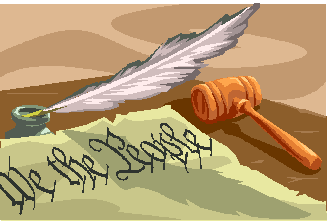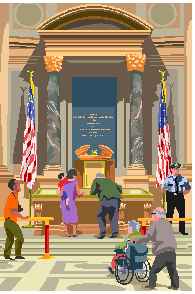|
It's official. Starting with the school year 2005,
all schools that receive federal monies must "hold an educational
program pertaining to the United States Constitution on September 17 of
each year." (If September 17 is on a weekend day, schools must recognize
Constitution Day the week before or after.) What that "educational
program" entails is not detailed in the
notice of implementation from the U.S. Department of Education, nor
is it detailed in the
federal appropriations bill that requires it. So it appears that the
recognition of Constitution Day is up to you.
In 1787, the Constitutional
Congress held it's final meeting on September 17. After months
of painstaking work, they met to sign the Constitution of the
United States of America. Of course much remained to be done;
the states still had to vote to ratify. It wouldn't be until
two years later -- on March 4, 1789 -- that the first U.S.
Congress met at Federal Hall in New York City to declare the
new Constitution to be in effect.
|
|
For that reason, Education World has gathered
resources that should help you figure out just how you might recognize
the day. Below you will find links to dozens of lesson ideas and other
resources that should provide the tools you will need to recognize
Constitution Day this year and in years to come.
Before we get to the lesson plans, let's take a
look at some of the best online resources for teaching about the U.S.
Constitution.
The National Archives
Any study of the U.S. Constitution should begin with the resources of
The National Archives.
The National Archives, which is the home of the original copy of the
U.S. Constitution, has been recognizing Constitution Day for many years.
Their resources include
actual images of the U.S. Constitution. You can view the images or
click the Read Transcript button for a text version. The site
also offers a clear and readable history of the creation of the
Constitution,
A More Perfect Union: The Creation of the U.S. Constitution, and
biographies of the participants. A long list of
questions and answers about the Constitution will help anyone better
understand this historic document.
In Words You Can Understand
Do your students (or you) get bogged down in the terminology of the
Constitution? Two online resources aim to help you clear the fog. The
National Constitution Center offers an
Interactive Constitution. Click on any of the images at the top of
the page to read an explanation of an article or amendment.
JusticeLearning.org presents a similar
Constitution Guide; click on any article or amendment, then click
the words What It Means for a straightforward explanation.
A Definitive Timeline
In
Centuries of Citizenship: A Constitutional Timeline, the National
Constitution Center offers a detailed description of the days leading up
to the Constitutional Convention all the way to the latest challenges to
it.
Creating a Constitution Gallery
The Library of Congress's
American Memory
Collection offers a rich collection of images related to the
Constitution in their
Documents from the Continental Congress and the Constitutional
Convention of 1774-1779.
The Constitution -- Not!
A lot of people presume a lot of things about the Constitution -- many
of which are not true. The Web site
U.S.
Constitution Online will set you straight about many of those
mistaken ideas on their
Things That Are Not in the U.S. Constitution page.
If you're looking to bring the creation of the
U.S. Constitution to life in your classroom, why not assign each student
to be one of the
signers of the Constitution. Have them research their namesakes and
write their own brief "autobiographies." Then the student-signers can
gather with other members of their state delegations to learn more about
their state's role in the ratification of the document.
If your Constitution Day activities will not be
that involved, Education World offers many alternative ideas. Check out
some of these.
Interview With the Signers of the Constitution
Students work in small groups to develop three questions that a
newspaper reporter assigned to cover the signing of the Constitution
might have asked signers George Washington, Benjamin Franklin, James
Madison, and Alexander Hamilton. (Grades 5-12)
Charting the Three Branches of Government
Students work in groups to create charts showing the structure and
functions of the three branches of government as outlined in the first
three articles to the Constitution. (Grades 5-12)
The "Net" is full of
resources to help you teach about the U.S. Constitution. We
caught a couple dozen great lesson ideas when we went
trolling the other day. Click
here for a complete list of those lesson plans.
|
|
Create a New Amendment
Students gain a greater understanding of the amendments to the
Constitution. After studying the amendments to the Constitution,
students propose a new amendment. (Grades 5-12)
Presidential Powers
Students study the section of the Constitution that refers to the
executive branch and write a proposal for a new power for the president.
Explaining the Bill of Rights
Students work in groups to rewrite the Bill of Rights in their own
words. (Grades 5-12)
Internet Scavenger Hunt: The Constitution of the United States
What do you know about the Constitution? Explore the Web site provided.
Then complete each statement on the printable work sheet. (Grades 3-8)
President James Madison: Father of the U.S. Constitution
Find ten errors of spelling, grammar, or punctuation in this paragraph
about President James Madison. Printable work sheet included. (Grades
3-8)
The Internet is full of resources to help you
teach about the U.S. Constitution. We found a couple dozen great
lesson ideas when we went surfing the other day. Click
here for a complete list of those lesson plans.
Article by Gary Hopkins
Education World®
Copyright © 2005 Education World
09/01/2005
|


